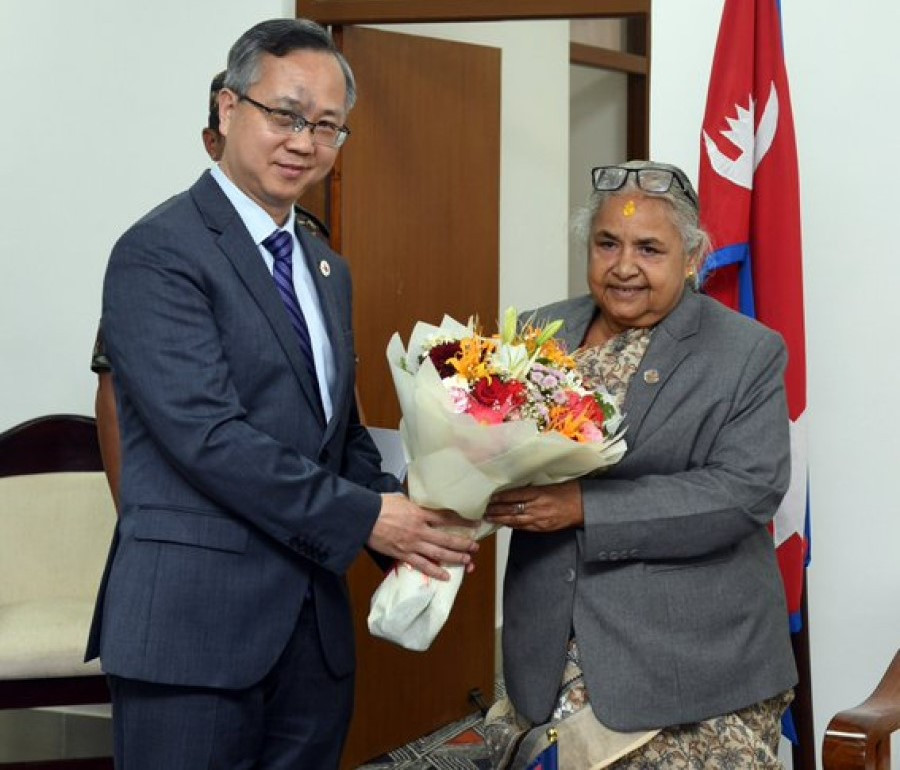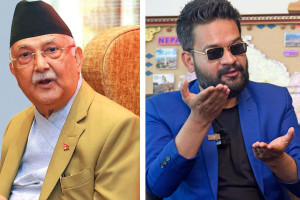Columns
Nepal-China relations under Karki government
PM Karki must demonstrate impartiality while avoiding the estrangement of any neighbour.
Mohammad Maruf Hasan
Following former Chief Justice Sushila Karki's nomination as Nepal's interim Prime Minister on September 12, commentators have focused on Nepal's foreign ties with China, observing how a transitional administration will navigate its more influential Himalayan neighbours. Emerging from widespread protests predominantly driven by Gen Z concerning corruption, inequality and political inertia, it confronts the combined problem of reinstating domestic stability while managing international ties. China, as a key ally, plays a significant role in this equilibrium.
Amidst a significant political upheaval in Nepal, the newly established interim administration is meticulously managing its relations with its northern neighbour. The diplomatic interactions between the two nations during this moment of uncertainty provide significant insights into the future direction of their bilateral ties and the broader geopolitical dynamics in South Asia.
China has congratulated Sushila Karki on her appointment as the prime minister of Nepal's interim government. China and Nepal maintain a longstanding friendship. China consistently honours the growth trajectory unilaterally selected by the Nepali populace. The sleeping giant seems to be prepared to collaborate with Nepal to advocate the five principles of peaceful coexistence, augment exchanges and collaboration across diverse sectors, and improve bilateral relations.
In these formal declarations from the Ministry of Foreign Affairs of China, the middle kingdom has emphasised continuity: It perceives the diplomatic relationship with Nepal as founded on "time-honoured friendship". It seeks to preserve the current framework of cooperation.
The initial interactions between the Karki administration and Chinese officials indicate that bilateral relations are expected to persist along their existing path, focusing on economic collaboration, infrastructure advancement and diplomatic backing on fundamental matters such as the One China Policy.
As the significant policy changes between the former administration and the Karki interim government continue to develop, numerous critical areas are anticipated to shape Nepal-China relations in the coming months.
Nepal's foremost foreign policy dilemma has consistently been manoeuvring its stance between the Asian and Western powers. Under the Karki interim administration, this equilibrium becomes increasingly precarious due to three interconnected realities: The government's brief duration, the escalating aggressiveness of both neighbouring countries and heightened domestic scrutiny about foreign involvement.
Nepal has historically adopted a policy of "equidistance," striving to maintain neutrality amongst its neighbouring countries. In fact, governments frequently shifted based on internal political considerations. Under PM Karki's leadership, the government is unlikely to implement significant changes but will pursue cautious diplomacy: Affirming existing collaboration while maintaining engagement with Beijing through active projects. This "calibrated neutrality" may align with public aspirations for sovereignty and autonomy.
Nepal has diversified its cross-border commerce with China by establishing road transit connections. Agreements reached in 2016 facilitated Nepal's access to Chinese ports and highways; nevertheless, implementation has been sluggish due to challenging Himalayan topography and infrastructural constraints. The Karki administration, constrained by time, is unlikely to conclude significant new agreements but may advocate for temporary measures such as streamlining customs processes, enhancing cross-border trade points like Kerung–Rasuwagadhi and optimising supply chains for critical commodities. These pragmatic steps would garner domestic political support and enhance China's position as an alternative trading partner.
China's presence in Nepal is predominantly evident through infrastructure development, including highways, hydropower facilities, airports and energy grids. During the KP Oli administration, numerous agreements about BRI projects were advanced; however, delays, financial difficulties and public scepticism concerning debt conditions impeded progress. The Karki administration, characterised by its reformist and transparent reputation, is expected to reassess these projects with a heightened focus on accountability and cost-benefit analysis. This may entail demanding more explicit loan terms, enhanced oversight measures and prioritising initiatives that genuinely benefit the Nepalese population over symbolic, large-scale projects. For Beijing, sustaining progress without inciting domestic opposition will be the primary task.
Nepal's considerable hydropower potential has drawn the interest of both state-owned and private Chinese enterprises. Hydropower projects such as West Seti and Budhi Gandaki, previously plagued by controversy and cancellation, epitomise both potential and peril. The Karki administration may promote hydroelectric investment, but it will face public pressure to guarantee that contracts are transparent, environmentally sustainable and not disproportionately advantageous to foreign investors. China's promotion of "green development" narratives within the BRI might effectively coincide with Nepal's aspirations for renewable energy.
Nepal's diplomacy must contend with great-power competition in addition to bilateral projects. As Oli adopted a more pro-Beijing stance, Karki is anticipated to pursue a more prudent and balanced strategy, emphasising Nepal's neutrality between China and India while discreetly engaging the U.S. and other partners for investment. This hedging tactic is crucial to prevent engagement in rivalry. China is expected to uphold this temporary stance provided that Nepal does not overtly contravene its fundamental interests.
Foreign policy is subject to intense public and media examination, particularly from younger generations who spearheaded the protests that facilitated Karki's leadership. They readily condemn ambiguous deals that seemingly undermine sovereignty, whether involving India, China, or other nations. This domestic element introduces a novel aspect to diplomatic equilibrium: Choices are evaluated not just by elites but also by a progressively assertive populace seeking accountability and openness. Karki's administration must consequently sustain a delicate balance in its discourse and actions, demonstrating impartiality while avoiding the estrangement of any neighbouring country.
The initial weeks of the Sushila Karki administration have delineated a framework of prudent interaction between Nepal and China, highlighting continuity, reciprocal advantage and non-interference. The geopolitical significance of Nepal's political transition is evolving; however, initial diplomatic talks indicate that both nations aim to sustain stable and constructive relations during this interim phase.
The Chinese Foreign Ministry, in its initial congratulations letter, affirmed China's readiness to collaborate with Nepal to promote the five principles of peaceful coexistence, boost exchanges and cooperation across all domains and further progress bilateral relations. The translation of this dedication into tangible results amid Nepal's political change and possible geopolitical realignment in the area constitutes one of the most intriguing narratives in South Asian affairs.




 11.12°C Kathmandu
11.12°C Kathmandu















